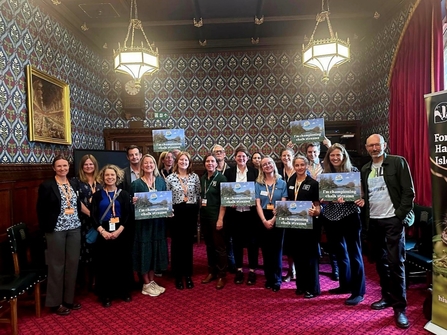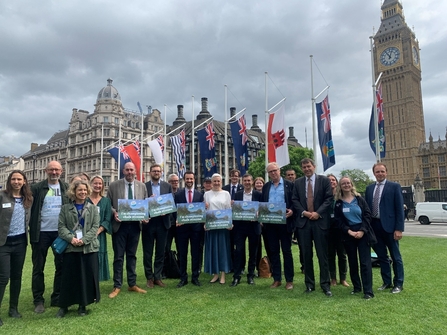UPDATE: THANK YOU to everyone who urged your MP to support the chalk stream protection amendment to the Planning Bill. Your efforts resulted in contributions from MPs about chalk streams dominating the debate with countless calls for their protection, 130 MPs voting in favour of the amendment, and new commitments from the Government for chalk streams. While we welcome these commitments, the protections must be robust and effective. Disappointingly, the Government ultimately rejected the amendment, but we’re not going to stop fighting for proper protections for chalk streams.
If you are interested in BBOWT campaigns, why not join our growing community of more than 1,000 Wildlife Ambassadors? We'll send you the latest campaign news and information on how to stand up for local nature. Sign up to be a Wildlife Ambassador!
Save our Chalk Streams
Currently, only 11 out of 220 British chalk streams have any legal protections, and even these fall short of the measures needed to defend these rivers.
England's chalk streams are one of the rarest habitats on earth! Their crystal-clear waters are home for salmon, water voles, white-clawed crayfish and kingfishers, making them our equivalent to the Great Barrier Reef or the Amazon Rainforest. A truly special habitat that we are lucky to enjoy.
Our chalk streams need protecting
Many of our chalk stream rivers are now polluted, dirty and choked by pollution, threatening the wildlife that calls them home and the people that rely on them for their wellbeing. The Government must introduce specific protections for all chalk streams in their planning reforms, to ensure these unique habitats are conserved and put into recovery for future generations.

How can chalk streams be protected?
Some chalk streams have been given Site of Special Scientific Interest (SSSI) status but this designation is not well-suited to protecting those chalk streams which are heavily influenced by activities across their catchments. New protections in planning will safeguard all chalk streams and give them a chance to recover.
We are calling for bespoke protection for our chalk streams, as outlined by the CaBA Chalk Stream Restoration Strategy.
These protections must:
- Introduce a 50m minimum ‘no development zone’ buffer as recommended by Natural England.
- Redefine chalk streams and their catchments as ‘irreplaceable habitats’, alongside ancient woodland, with stronger wording to protect chalk streams throughout national planning policy guidelines.
- Encourage parallel investment in water supply and treatment infrastructure as a condition of planning approval.
What are BBOWT doing?
November 2025
The Planning and Infrastructure Bill returned to the Commons for MPs to consider the Lords amendments, including the chalk stream protection amendment.
Thank you to all of you who urged your MP to support the amendment! Your efforts resulted in contributions from MPs about chalk streams dominating the debate with countless calls for their protection, 130 MPs voting in favour of the amendment, and new commitments from Government for chalk streams!
Housing Minister, Matthew Pennycook said, “The Government acknowledge the case for giving explicit recognition to chalk streams in national planning policy, […] we will lay out and consult on proposals to include that explicit recognition and in so doing make clear, unambiguously, our expectations for how plan makers and decision makers should treat chalk streams.”
However, as for the amendment itself, the Government whipped* its supporters to reject it, so the result of the vote was to disagree to (reject) including chalk stream protections in the bill (amendment 38). You can see a full breakdown of the vote, including if and how your MP voted, here: Planning and Infrastructure Bill (Division 353: held on 13 November 2025).
*What is a whip? In politics, a ‘whip’ is a written instruction issued by a party to their MPs detailing how they are expected to vote.
Thank you to the MPs who spoke up for chalk streams in the debate! As for our local MPs across our 3 counties - thank you to Greg Smith MP for Mid Buckinghamshire, Jack Rankin MP for Windsor, Clive Jones MP for Wokingham, Charlie Maynard MP for Witney, and Calum Miller MP for Bicester and Woodstock for voting.
Last chance for the amendment - On 24 November, the Lords had the opportunity to insist on the chalk stream amendment, which would have sent it back to the Commons again for MPs to reconsider. The Lord Bishop of Norwich (who originally tabled the amendment) again pushed for a vote.
The Minister reiterated the commitment to recognise chalk streams in a new national policy for decision-making, as well as making further commitments:
- “The Government will embed actions to improve chalk streams into the water White Paper, which will be published before the end of the year.”
- “In responding to this amendment in the other place, the Government committed to amend statutory guidance to encourage chalk streams to be featured prominently in local nature recovery strategies going forward.”
Unfortunately, after hearing these concessions, Peers voted against the chalk stream amendment. Thank you again to the Lord Bishop of Norwich, we’re grateful for all his efforts.
There is still hope for chalk streams yet! We welcome the Government’s recognition of the need for chalk stream protections and the commitments made BUT these protections must be robust and effective. The Save Our Chalk Streams campaign is not over. As ever, we will continue to call for proper protections for our chalk streams, lobby decision makers and hold Government to these new commitments as we learn more about what they involve.
Summer/Autumn 2025
The fight to secure protections for chalk streams in the Planning and Infrastructure Bill continued!
Despite clear cross-party consensus from the committee that chalk streams are truly special, important, globally unique, and that we should be doing more to protect them, the amendment was rejected.
More MPs gave passionate and strong arguments for chalk streams at the report stage, but unfortunately and once again, the amendment was rejected.
Thank you to all the MPs who spoke up, but thanks especially to chalk stream champion, Chris Hinchliff MP.
BBOWT and many other chalk stream supporters disagreed with the Government’s arguments that their current systems and future Water Bill would be enough to protect chalk streams and thankfully so did The Lord Bishop of Norwich. As the Bill moved to the Lords, the amendment was tabled at the Lords committee stage, but the amendment was not moved.
However, the Lord Bishop, still unsatisfied with the government’s arguments and weak proposals and promises, re-tabled the amendment at the Lord’s report stage and pushed for a vote. Before voting, peers heard many great supportive contributions to the debate, including the Lord Bishop’s own strong and thoughtful speech. He ended by saying, “We cannot wait for a water reform Bill and have these arguments again at that stage. Amendment 94 seeks to protect chalk streams, this precious habitat which we are the custodians of. It aims to restore biodiversity and create a planning system that works with nature, not against it. At present, I am afraid, the Bill before us fails to do this for chalk streams.”
And it seemed the House of Lords agreed with him as they voted FOR the amendment to be included in the Bill. The result was 196 for and 137 against (nearly all of which were Labour peers).
Thank you to all the peers who voted for and spoke in support of the amendment, and a BIG thank you to the Lord Bishop of Norwich.
June 2025
We went to Westminster!
Alongside our friends from fellow Wildlife Trusts, The Rivers Trust, the Angling Trust, ARK and many more, BBOWT went to parliament to raise awareness among MPs about the importance of chalk streams and the threats they face. We discussed how we can work together to protect and restore chalk streams, both in our local patch and nationally.
A big thank you to Olivia Bailey MP for Reading West and Mid Berkshire for hosting all of us and championing chalk streams.

We also asked MPs to support amendments to the Planning and Infrastructure Bill that would give chalk streams better protections. Sadly, these amendments were ultimately rejected despite strong cross-party support.
However, we’re not giving up the fight for chalk streams, and neither are many supportive MPs. The Wildlife Trusts, who are members of the Save Our Chalk Streams campaign, met with 10 MPs who stood, cross-party, side by side outside Parliament to back our call to have proper protections for England’s globally rare chalk streams.

March 2025
We asked our MPs to attend the second reading of the Planning & Infrastructure Bill on 24th March to raise the importance of chalk streams and the need for protections for them in the planning system. During the reading, chalk streams were mentioned 15 times!
Chris Hinchliff MP tabled the chalk stream protection amendment. We are asking all our MPs to add their name and show their support.
February 2025
The Minister of State for Housing and Planning, Matthew Pennycook, responded to our joint open letter.
November 2024
We signed an open letter to Deputy Prime Minister and Secretary of State for Housing, Communities and Local Government, The Rt Hon Angela Rayner MP.
Find out more: Nature charities urge UK Government to protect rare chalk streams
October 2024
We asked our MPs to attend the ‘Chalk Streams: Sewage Discharge’ debate. Local chalk streams, including the Pang and the Loddon, were discussed as well as the need for recognised special status and designation for chalk streams, buffer zones and nature-based solutions. Click below to read the full debate.
September 2024
We asked our supporters to complete our e-action to respond to the Government’s planning reforms in the National Planning Policy Framework consultation. The e-action allowed you to personalise your response with why you think chalk streams are so special into a template with our policy asks. Hundreds of supports took this action so thank you!
Save our Chalk Streams (https://www.youtube.com/watch?v=Nyi4ibdqFpg)
BBOWT president Steve Backshall explains the importance of chalk streams and how you can help to protect them.
October 2023
The Wildlife Trusts put on a parliamentary roundtable hosted by Maria Miller MP to bring attention to the crisis, and several other MPs advocated for more ambitious measures to safeguard chalk streams in the Government’s plans.

CEOs of BBOWT and Hampshire and Isle of Wight (Estelle Bailey and Debbie Tann) and Water Policy Manager at the Wildlife Trusts (Ali Morse) meet with MPs about chalk streams.
Autumn 2023
We asked supporters to email their MP to help chalk streams today – not in 2063.
September 2023
BBOWT join forces with other local Wildlife Trusts to launch the Save Our Chalk Streams campaign.
What you can do!
The Planning and Infrastructure Bill was a key opportunity to put protections in place for our precious chalk streams. While the Government made some commitments, for the time being, these are only words. We don’t yet know the details or how strong and effective the policies will be. In the meantime, the amendment could have kept chalk streams safe, but the Government instructed their MPs to vote against it.
If you care about chalk streams and their protection, it is important to tell your MP.
When raising the issue to your MP by email, letter or in person, remember to thank them if they voted for the amendments (see how MPs in Berks, Bucks and Oxon voted below). If they voted against the amendments, please express your disappointment and ask them to reconsider. If they did not vote, remind them of the importance of chalk streams and why protecting and restoring them matters to you.
If you want to go a step further, ask your MP to write to Ministers in the Ministry of Housing, Communities and Local Government to urge them to ensure the commitments made by the Government in response to the amendment must include legally binding protection for chalk streams and their catchments.
How your MP voted
Voted against the amendments (all Labour MPs)
- Callum Anderson (Buckingham and Bletchley)
- Olivia Bailey (Reading West and Mid Berkshire)
- Chris Curtis (Milton Keynes North)
- Emily Darlington (Milton Keynes Central)
- Tan Dhesi (Slough)
- Laura Kyrke-Smith (Aylesbury)
- Emma Reynolds (Wycombe)
- Matt Rodda (Reading Central)
- Peter Swallow (Bracknell)
- Yuan Yang (Earley and Woodley)
- Sean Woodcock (Banbury)
Voted for the amendments
- Greg Smith (Mid Buckinghamshire) Conservative
- Jack Rankin (Windsor) Conservative
- Clive Jones (Wokingham) Liberal Democrat
- Charlie Maynard (Witney) Liberal Democrat
- Calum Miller (Bicester and Woodstock) Liberal Democrat
No vote
- Anneliese Dodds (Oxford East) Labour
- Joy Morrisey (Beaconsfield) Conservative
- Lee Dillon (Newbury) Liberal Democrat
- Olly Glover (Didcot and Wantage) Liberal Democrat
- Layla Moran (Oxford West and Abingdon) Liberal Democrat
- Joshua Reynolds (Maidenhead) Liberal Democrat
- Freddie Van Mierlo (Henley and Thame) Liberal Democrat
- Sarah Green (Chesham and Amersham) Liberal Democrat

The Letcombe Brook running through BBOWT's Letcombe Valley nature reserve. Picture: M Bailey
Chalk streams near you
Among the glorious rivers we have in our three counties are some of the country’s most beautiful chalk streams.
In Oxfordshire, the Letcombe Brook and Chalgrove Brook are both chalk streams; Berkshire is home to the Pang, Kennet, Aldbourne, Dun and Lambourne, while Buckinghamshire boasts the Chess, Misbourne and Wye.
FAQs
Why are chalk streams special?
With only around 220 existing worldwide, these cool, fresh, oxygen-rich waters provide the perfect habitat for rare British species like water vole, southern chalk stream Atlantic salmon, brown trout, southern damselfly, water crowfoot, and white-clawed crayfish.
Over 85% of the 220 chalk streams in the world are found in the South of England, truly one of the rarest habitats on the planet. They are also incredibly rich in life; home to more species of plants than any other English river and include species found nowhere else. They are England's equivalent to the Great Barrier Reef or the Amazon Rainforest: a truly special natural heritage and our responsibility.
How are chalk streams under threat?
England's rarest habitat and richest chalk streams should be clear, and sparkling with vitality. Instead they are becoming clogged and choked by toxic chemicals, fertilisers and sewage. Drought and over consumption are draining the life out of rivers, with devastating consequences for the wildlife and people that rely on them.
Healthy rivers are vital for our water supply, our food security and our ability to withstand a changing climate. We can't allow the abuse of these vital life support systems to continue.
Do any chalk streams have protection?
Currently, only 11 out of the 220 British chalk streams have any legal protections as a Site of Special Scientific Interest (SSSI). These are Berkshire and Wiltshire’s Kennet, Hampshire’s Test, Somerset’s Frome, Dorset’s Bere Stream, Norfolk’s Nar, Yorkshire’s Hull headwaters and Greater London’s Crane.
Only 4 are protected as Special Areas of Conservation (SAC), a higher level of protection: Berkshire’s Lambourn, Hampshire and Wiltshire‘s Avon, Hampshire’s Itchen and Norfolk’s Wensum. But while these protections are helping to keep these rivers in a better state than chalk streams that are not protected, we need stronger regulations specifically designed for our chalk streams.
The Government said that our rivers won't be healthy until 2063. Why?
Currently, only 16% of waters in England are in good ecological health and none meet chemical standards. Staggeringly, this means not one of England's chalk streams, rivers, lakes, estuaries or seas are in an overall healthy condition. Even the 16% that are in good ecological health are not in good health overall because of the chemicals they contain.
Previous targets required by the Government to get our rivers in to good overall health by 2015 and 2021 have been missed.
The Government's 'river basin management plans' that launched in 2022 stated that the Government predicts that all of our rivers and streams won't be in good overall health until 2063. That's four decades away!

